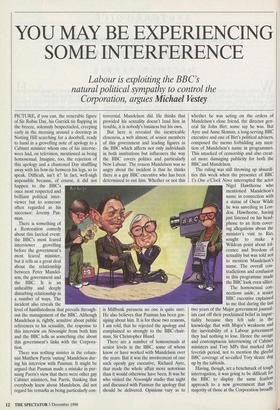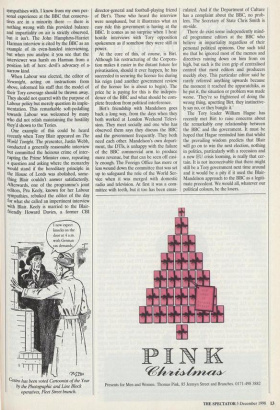YOU MAY BE EXPERIENCING SOME INTERFERENCE
Labour is exploiting the BBC's natural political sympathy to control the Corporation, argues Michael Vestey
PICTURE, if you can, the venerable figure of Sir Robin Day, his Garrick tie flapping in the breeze, solemnly bespectacled, creeping early in the morning around a doorstep in Notting Hill searching for a doorbell, ready to hand in a grovelling note of apology to a Cabinet minister whom one of his intervie- wees had, on television, mentioned as being homosexual. Imagine, too, the rejection of this apology and a chastened Day shuffling away with his bow-tie between his legs, so to speak. Difficult, isn't it? In fact, well-nigh impossible because, of course, it did not happen to the BBC's once most respected and brilliant political inter- viewer but to someone often regarded as his successor: Jeremy Pax- man.
There is something of a Restoration comedy about this farcical event: the BBC's most feared There was nothing sinister in the colum- nist Matthew Parris 'outing' Mandelson dur- ing his interview with Paxman. It might be argued that Paxman made a mistake in pur- suing Parris's view that there were other gay Cabinet ministers, but Parris, thinking that everybody knew about Mandelson, did not regard his remarks as being particularly con- troversial. Mandelson did. He thinks that provided his sexuality doesn't land him in trouble, it is nobody's business but his own.
But here is revealed the inextricable closeness, a web almost, of senior members of this government and leading figures in the BBC which affects not only individuals in both institutions but influences the way the BBC covers politics and particularly New Labour. The reason Mandelson was so angry about the incident is that he thinks there is a gay BBC executive who has been determined to out him. Whether or not this is Millbank paranoia no one is quite sure. He also believes that Paxman has been gos- siping about him. It is for these two reasons, I am told, that he rejected the apology and complained so strongly to the BBC chair- man, Sir Christopher Bland.
There are a number of homosexuals at senior levels in the BBC, some of whom know or have worked with Mandelson over the years. But it was the involvement of one such openly gay executive, Richard Ayre, that made the whole affair more notorious than it would otherwise have been. It was he who visited the Newsnight studio that night and discussed with Paxman the apology that should be delivered. Opinions vary as to whether he was acting on the orders of Mandelson's close friend, the director gen- eral Sir John Birt; some say he was. But Ayre and Anne Sloman, a long-serving BBC executive and one of Birt's political advisers, composed the memo forbidding any men- tion of Mandelson's name in programmes. This smacked of censorship and also creat- ed more damaging publicity for both the BBC and Mandelson.
The ruling was still throwing up absurdi- ties this week when the presenter of BBC l's One o'Clock News interrupted the actor Nigel Hawthorne who mentioned Mandelson's name in connection with a statue of Oscar Wilde he was unveiling in Lon- don. Hawthorne, having just listened on his head- phone to an item cover- ing allegations about the minister's visit to Rio, sought to make a Wildean point about tol- erance and freedom of sexuality but was told not to mention Mandelson's name. The overall con- tradictions and confusion in this programme made the BBC look even sillier.
The homosexual con- nections aside, a senior BBC executive explained to me that during the last two years of the Major government journal- ists cast off their proclaimed belief in impar- tiality because they felt safe in the knowledge that with Major's weakness and the inevitability of a Labour government they had nothing to lose. Hence the savage and contemptuous interviewing of Cabinet ministers and Tory MPs that marked that feverish period, not to mention the gleeful BBC coverage of so-called Tory sleaze dug up by the tabloids. Having, though, set a benchmark of tough interrogation, it was going to be difficult for the BBC to display the same fearless approach to a new government that the majority of those at the Corporation broadly sympathises with. I know from my own per- sonal experience at the BBC that conserva- tives are in a minority there — there is nothing wrong with this provided balance and impartiality on air is strictly observed, but it isn't. The John Humphrys-Harriet Harman interview is cited by the BBC as an example of its even-handed interviewing, but when you analyse it you see that the interviewer was harsh on Harman from a Position left of hers: devil's advocacy of a• narrow kind.
When Labour was elected, the editor of Newsnight, acting on instructions from above, informed his staff that the model of their Tory coverage should be thrown away. They should not quarrel with the purpose of Labour policy but merely question its imple- mentation. This remarkable soft-pedalling towards Labour was welcomed by many who did not relish maintaining the hostility they'd shown to the Tories.
One example of this could be heard recently when Tony Blair appeared on The World Tonight. The presenter, Justin Webb, Conducted a generally reasonable interview but committed the heinous crime of inter- rupting the Prime Minister once, repeating a question and asking where the monarchy would stand if the hereditary principle in the House of Lords was abolished, some- thing Blair couldn't answer satisfactorily. Afterwards, one of the programme's joint editors, Pru Keely, known for her Labour sympathies, rebuked the editor of the day for what she called an impertinent interview With Blair. Keely is married to the Blair- friendly Howard Davies, a former CBI Castro has been voted Cartoonist of the Year by the Photographic and Line Block operatives, Fleet Street branch. director-general and football-playing friend of Birt's. Those who heard the interview were nonplussed, but it illustrates what an easy ride this government is having at the BBC. It comes as no surprise when I hear hostile interviews with Tory opposition spokesmen as if somehow they were still in power.
At the core of this, of course, is Birt. Although his restructuring of the Corpora- tion makes it easier in the distant future for privatisation, should it ever happen, he has succeeded in securing the licence fee during his reign (and another government review of the licence Tee is about to begin). The price he is paying for this is the indepen- dence of the BBC and what should be com- plete freedom from political interference.
Birt's friendship with Mandelson goes back a long way, from the days when they both worked at London Weekend Televi- sion. They meet socially and one who has observed them says they discuss the BBC and the government frequently. They both need each other. Mandelson's own depart- ment, the DTIs, is unhappy with the failure of the BBC commercial arm to produce more revenue, but that can be seen off easi- ly enough. The Foreign Office has more or less wound down the committee that was set up to safeguard the role of the World Ser- vice when it was merged with domestic radio and television. At first it was a com- mittee with teeth, but it too has been emas- culated. And if the Department of Culture has a complaint about the BBC, no prob- lem. The Secretary of State Chris Smith is on-side.
There do exist some independently mind- ed programme editors at the BBC who believe in impartiality regardless of their personal political opinions. One such told me that he ignored most of the memos and directives raining down on him from on high, but such is the iron grip of centralised control that most editors and producers meekly obey. This particular editor said he rarely referred anything upwards because the moment it reached the apparatchiks, as he put it, the situation or problem was made worse. 'They're so frightened of doing the wrong thing, upsetting Birt, they instinctive- ly say no, or they bungle it.'
The Tory leader William Hague has recently met Bid to raise concerns about the remarkably cosy relationship between the BBC and the government. It must be hoped that Hague reminded him that whilst the prevailing wisdom predicts that Blair will go on to win the next election, nothing in politics, particularly with a recession and a new EU crisis looming, is really that cer- tain. It is not inconceivable that there might still be a Tory government next time around and it would be a pity if it used the Blair- Mandelson approach to the BBC as a legiti- mate precedent. We would all, whatever our political colours, be the losers.



















































































 Previous page
Previous page